The Westralian Worker
John Curtin came to Western Australia in January 1917, after the State Branch of the Australian Labor Party [ALP] had accepted the recommendation of both Frank Anstey, the Member for Bourke, and Hugh Mahon, the Member for Kalgoorlie, and appointed him as editor of the weekly paper The Westralian Worker.[13] On board the SS. Katoomba on the way to Perth, Curtin wrote thanking Mahon for his 'good offices' in helping him to secure the position.
Curtin replaced John Hilton, who had supported conscription. In an editorial on 6 October 1916, Hilton expressed the opinion that the Labor Party in Western Australia was 'hopelessly divided' upon the issue of conscription. Consequently, the paper would adopt a neutral stance since it could not 'speak authoritatively of the whole, or even a pronounced majority, of the party'.
This impasse was resolved only when the pro-conscriptionist, James Cornell, resigned as Acting Secretary of the State Executive, and was replaced by the anti-conscriptionist, Andrew Clementson. Clementson developed a strategy for expelling members who had not supported the Party's anti-conscription stance; part of this strategy was to remove Hilton and replace him with an eloquent advocate of the anti-conscription cause. [14] Who better to choose than John Curtin, with his proven editorial track record, his ability as a public speaker and his recent activities in the Victorian anti-conscription movement?
Apart from Phillip Collier, the new leader of the State Parliamentary Labor Party (SPLP) and Alex McCallum, the ALP State Secretary, John Curtin would exert the greatest influence on the events of the 1917 anti-conscription campaign in Western Australia. Arriving two months before nine pro-conscriptionists were expelled from the State ALP, he immediately adopted an editorial policy of attacking Prime Minister W.M. Hughes and his newly-formed National coalition. During the 1917 campaign, the Worker was almost entirely devoted to the issue of conscription, with Curtin using statistics to disprove Hughes' claims regarding the required number of military reinforcements for overseas service. [15]
John Curtin was one of the most effective propagandists in the 'anti' camp, once Hughes had announced that there would be a second referendum on the issue held on 20 December 1917. Not restricting his comments to the editorial, he penned many paragraphs in the weeks prior to the December referendum. On 23 November, he wrote:
What can be said in justification for the draining of the blood from the youth of this or any other country in order that the gibbering spectre may quaff the rich red fluid and gloat over the maimed bodies and blistered souls of the stricken members of the human family? Nothing. [16]
Florid language aside, as in 1916, most of Curtin's anti-conscription arguments were based on sound logic and reasoning.
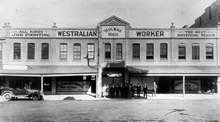 Westralian Worker building, c1920. Records of the Australian Labor Party WA Branch. JCPML00379/1.
Westralian Worker building, c1920. Records of the Australian Labor Party WA Branch. JCPML00379/1.
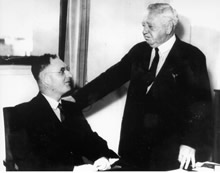 John Curtin with Frank Anstey in the Depression Years, n.d. Records of West Australian News Ltd. JCPML00409/4.
John Curtin with Frank Anstey in the Depression Years, n.d. Records of West Australian News Ltd. JCPML00409/4.
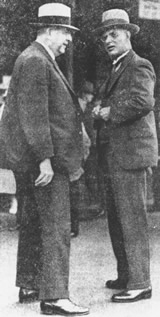 John Curtin & Phillip Collier at Perth Railway Station, n.d. Records of David Black. JCPML00180/1.
John Curtin & Phillip Collier at Perth Railway Station, n.d. Records of David Black. JCPML00180/1.
The voluntary system
Curtin devoted a number of lengthy editorials to putting arguments against the adoption of conscription. He claimed that voluntarism had not failed. Instead, the Prime Minister, W.M. Hughes, had got his sums completely wrong. In 1916 Hughes had asserted that 16,500 extra volunteers per month was the minimum necessary to provide enough reinforcements for the front without introducing conscription. In 1917, he revised the figure to 7,000 per month, but Curtin claimed that the revised figure was similarly excessive.
In an editorial on 7 December 1917, he asked whether Hughes' word could be trusted, and argued that it could not be because:
W M Hughes has said time and again that voluntarism had failed. IT HAS NOT, AND THE OFFICIAL FIGURES PROVE IT. The total enlistments to November 3, 1917, were 383,929. The total casualties up to November 10, 1917, were 114,747. Of these casualties 74,865 were sick and wounded, and of these it is calculated that 80 per cent, or 59,882, return to the firing line. We will take it, however, that the whole 114,747 have been put out of action. Therefore, subtracting that number from the total of enlistments, we find that there are available 269,182 men. There are fighting in France and Flanders five divisions, or 100,000 men, and in Egypt and Palestine, say, another division, or a total of 120,000. Subtracting that total from the number available, we get 149,182 men ready as reinforcements. But Pearce says 60,000 of these men that should be available, are not available. Let us knock them off then. Assuming that reinforcements are needed at the rate of 7,000 a month, WE HAVE HERE A RESERVE, EVEN IF NOT ANOTHER RECRUIT ENLISTED, SUFFICIENT TO KEEP UP THE STRENGTH OF ALL THE DIVISIONS FOR THE NEXT YEAR. [17]
Curtin was deeply grieved that the damage that the conscription split caused the Labor Party had not been repaired. Anti-conscriptionists who told the truth were prosecuted; pro-conscriptionists (including two Labor leaders, Hughes and Pearce) uttered spurious arguments and lies and were allowed to go unpunished, even after some of the arguments were shown to be erroneous. [18]
On the eve of the second referendum, Curtin wrote:
[I]t must be remembered that the question to be decided on Thursday is NOT whether Australia shall continue to fight Germany or pull out of the war. Conscriptionists tell you that this is so - but they said the same 15 months ago. The question is whether we shall continue to send a regular stream under the voluntary system or bundle practically the whole of our non-exempted manhood in under conscription. Laborites should bear in mind that a NO vote now will be a vote of protest against the present administration in not checking the shameful robbery of the people through high prices. Today we have only one method of protest - the voluntary system. That is the lever by which democracy can accomplish much. Turn down conscription, and if recruits are needed the Federal authorities will be compelled to tackle the problems that militate against recruiting - the high cost of living, the repatriation of returned men, and the lifting of the burden of taxation from the workers, including, of course, the small business man, on to the shoulders of those best able to bear it - Big Business, the financial institutions, and the exploiters generally. Make no mistake about it. THAT IS THE TRUE POSITION. Recruits can still be got either way. WEALTH PREFERS THE CONSCRIPTION ... WHICH WAY DO YOU, AS A LABORITE, PREFER? Remember, the young men, most of them brothers of those at the front, ARE NOT COWARDS. They will fight and fight readily, if wealth is made to bear its share. Vote NO against conscription and let the Government understand in no unmistakable manner that it must do ITS bit towards recruiting. Again, vote NO! [19]
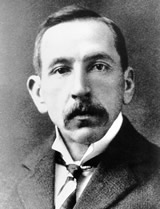 William Morris Hughes, PC, KC (1862-1952) Prime Minister 1915-1923. Records of the Government Photographic Service. JCPML00036/7.
William Morris Hughes, PC, KC (1862-1952) Prime Minister 1915-1923. Records of the Government Photographic Service. JCPML00036/7.
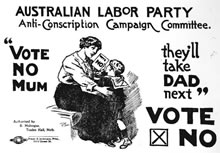 'Vote no Mum, they'll take Dad next', Australian Labor Party, Anti-Conscription Campaign Committee poster.
'Vote no Mum, they'll take Dad next', Australian Labor Party, Anti-Conscription Campaign Committee poster.
Courtesy of the National Library of Australia, vn3697266.
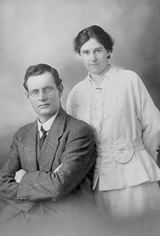 Elsie and John Curtin, October 1917.
Elsie and John Curtin, October 1917.
Records of the Curtin Family. JCPML00376/14.
Causing disaffection to the King
Curtin did not confine his remarks to the Westralian Worker. He was one of the most fluent and effective public speakers at anti-conscription meetings. Often prevented from hiring halls, the anti-conscriptionists were forced to hold street corner meetings, where Curtin was in his element. On one particular evening, he addressed crowds in Murray Street as the pubs were emptying. One big man kept interjecting, 'Who won the war?' to which Curtin responded, 'You did! You did!' This drew the crowd's interest and they listened to Curtin for almost two hours. Afterwards, Curtin said ruefully to one of his companions, 'I wanted to catch the 10 o'clock train. I promised my wife I'd be home early tonight'. [20]
Police officers attended these meetings and made transcripts of speeches, which they forwarded to the Censor. Several speakers, including Curtin, Senator Edward Needham and Don Cameron, were charged with offences under the War Precautions Act. In most of these cases, the charges were dropped, but Curtin was charged with making a statement 'prejudicial to recruiting and likely to cause disaffection to His Majesty the King' and summoned to appear in court. Detective-sergeant Ebbeson, who had taken notes in long hand at the meeting, claimed that Curtin said:
Mr Hughes says that if the referendum is not carried conscription will be introduced to Australia, and in that case if conscription is passed, I deny their right to force conscription on me, and the cause will be just if we rebel. The worst form of revolution is that which is forced on men of a free and democratic country. Revolution in despotic countries is the necessary solution of their difficulties.
The defence argued that, as Curtin was a very fast speaker, sometimes achieving a rate of 180-190 words a minute, it was unlikely that Ebbeson could reproduce his exact words. Curtin's lawyer, Mr. Dwyer, illustrated this by reading a passage from a book, while the police officer took notes. Afterwards, Ebbeson admitted that he had written down only two words. Curtin maintained that he had said:
[Mr Hughes's] declaration to force conscription is a denial of the popular rule and is in fact the worst form of rebellion. It means revolution in the interests of reaction, and that in a country which is described as free and democratic. Revolutions against despotism are the historical process of liberty. The solution of the popular impasse has frequently been found in that way. But we are faced with a problem of a different kind. Mr. Hughes' assertion is not a challenge to a despotic government but an attack on the declared verdict of a sovereign people.
Other witnesses testified that Curtin had not used the words 'rebelling' and 'revolution' in the sense imputed by the prosecution, but to not avail. He was fined £15 and ordered to enter into a surety of £25 that in future he would comply with the National Security Regulations. He appealed unsuccessfully, and was forced to pay, but had his fine reimbursed by the Commonwealth Government in 1920. [21]
On 20 December, a bigger majority than in 1916 voted against the introduction of conscription for overseas service; Western Australia was the only state to record a significant 'Yes' majority of about 65 per cent. This result put the issue to rest for the remainder of the war, but the deep bitterness over Hughes' creation of the National Labor Party was not resolved for many years.
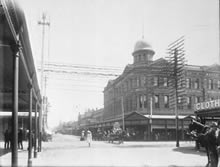 Murray Street Perth, looking West to South from Barrack Street, 1910.
Murray Street Perth, looking West to South from Barrack Street, 1910.Courtesy of the National Archives of Australia, image no. K1131, X23/1
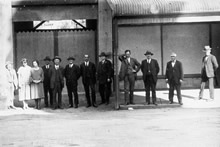 Westralian Worker staff, c1920 (John Curtin is 4th from the right). Records of the Australian Labor Party WA Branch. JCPML00379/2.
Westralian Worker staff, c1920 (John Curtin is 4th from the right). Records of the Australian Labor Party WA Branch. JCPML00379/2.